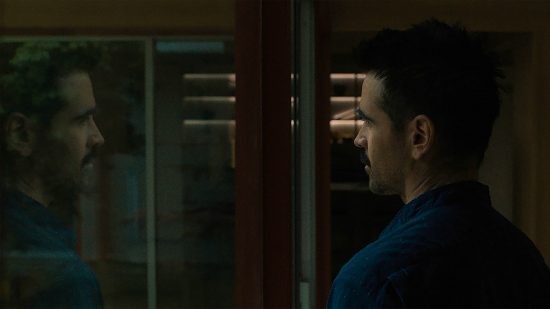Sundance 2022 Review: After Yang – “Deftly explores the pain of loss and grief, the power of memory”

Colin Farrell appears in After Yang by Kogonada, an official selection of the Spotlight section at the 2022 Sundance Film Festival. Courtesy of Sundance Institute | photo by Benjamin Loeb / A24.
In 2017, director Kogonada premiered his debut feature Columbus at the Sundance Film Festival to critical acclaim. If you haven’t seen it, the film is stunningly beautiful, has a calm and serene nature about it as its stars John Cho and Hayley Lu Richardson cope and struggle with familial responsibilities. There is clearly drama, emotion and message to be found in things that people see as routine, that people experience just by living. Says Kogonada in the production notes for his newest feature After Yang, “I’m interested in the burden and beauty of everydayness, that fine line between being stuck and being aware.”
After Yang takes place somewhere in the future, a gentle entry into sci-fi territory for the director, while sticking to the visually striking, intelligent stylings of his debut. Adapted from the short story “Saying Goodbye to Yang” by Alexander Weinstein, the film expands on themes of loss, memory and connection.
These androids, called technosapiens, seem common in this world, and as replaceable as our phones are today. But when Yang suddenly malfunctions and turns off, Mika is devastated and the loss within the family is palpable. Instead of exchanging the android’s parts or purchasing anew as is suggested to him, Jake embarks on a mission to fix Yang, at first for his daughter, but then also for himself as he realizes and mourns the profound connection the two beings had.
As a way of learning, androids in this fable are able to record and save three seconds of each day of their life and After Yang utilizes this plot point to startling effect. The knowledge and emotion gleaned from these short snippets of Yang’s past life are quite poignant. The images he has chosen to save range from landscapes, to mirror images, to visions of a mysterious young woman (Hayley Lu Richardson). We see these images as Jake sees them, like how we may wander through our own memories, though as recordings these ones are more reliable.
Kogonada deftly explores the pain of loss and grief, the power of memory, and the importance of family all while asking what it means to be truly human. Are the connections we make and emotions we feel what make us human? Is this unique to us alone? Will that always be? With every beautiful and intentional frame, Kogonada creates a world where these questions can be asked, yet he keeps it grounded, warm; cozy even. Unusual for sci-fi perhaps, but not for this director.
After Yang benefits from restrained and understated performances by its leads and a remarkable young Tjandrawidjaja as well as supporting cast that includes Clifton Collins Jr and Sarita Choudhury. I’d be remiss if I also didn’t point out the opening dance number (yes, dance number) in which the cast takes part as a highlight of my day. In fact, if I could watch the title credits on repeat I most certainly would. During the movie’s Q&A, the director described this sequence like confetti, exploding onto the screen, with the movie that follows gently falling through the air. It’s a metaphor that really fits the feel of After Yang, just like tea leaves swirling in a glass, a visual used within this film. The tea embodies a time, a place, a history and Kogonada infuses his film with an intellectual exploration of all of this, rooted deeply in the human emotions we feel.










